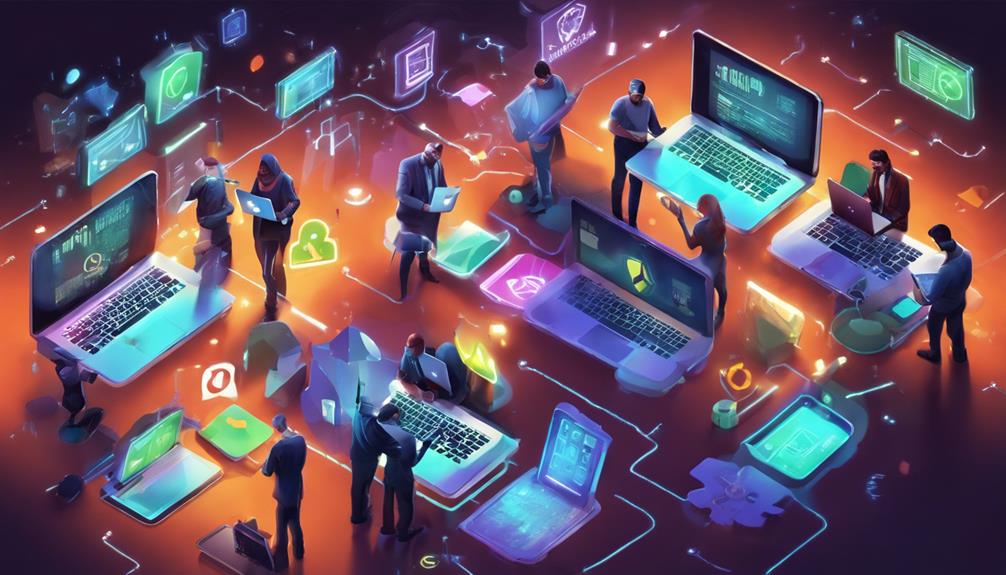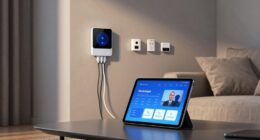To keep your bank account safe from hackers, start by creating strong and unique passwords with a mix of characters, numbers, and symbols. Implement two-factor authentication for added security, utilize authenticator apps, and consider Enhanced Account Verification for financial transactions. Be cautious with public Wi-Fi, use VPNs for encrypted connections, and install ad blockers to prevent malware. Regularly update software, verify URLs in emails, and check email authenticity before clicking links. Monitor financial activity regularly and consider the importance of online privacy. These steps are essential for safeguarding your bank account in today's digital world.
Key Takeaways
- Use strong, unique passwords with a mix of characters.
- Enable two-factor authentication for added security.
- Avoid public Wi-Fi for sensitive transactions.
- Regularly update software and utilize a VPN.
- Verify URLs and be cautious of phishing attempts.
Strong and Unique Passwords
Utilize strong and unique passwords to safeguard your bank account from potential hackers by incorporating a mix of characters, numbers, and symbols, while avoiding common phrases and personal information. Strong passwords are essential for enhancing the security of your online accounts, including your bank account, as they make it considerably harder for hackers to crack them. By using longer passwords with a minimum of 12 characters, you can further fortify your account against unauthorized access attempts.
Consider utilizing a password manager to not only generate complex and unique passwords but also to securely store them for easy access. Password managers provide a convenient solution for managing multiple strong passwords across various accounts, reducing the risk of forgetting or compromising them.
Regularly updating your passwords, ideally at least once every year or two, is vital for maintaining the security of your bank account and other online accounts. By frequently changing your passwords, you minimize the chances of unauthorized access and enhance the overall protection of your sensitive information.
Two-Factor Authentication

Two-factor authentication is an essential security measure for safeguarding your bank account. This method requires both a password and a second form of identification, like a one-time code, to access your account.
Secure Login Methods
Enhancing the security of your bank account login process can be achieved through the implementation of two-factor authentication, a robust method that requires both a password and a secondary form of verification. This secure login method is vital in safeguarding your financial information from unauthorized access. By adding an additional security barrier, two-factor authentication greatly reduces the risk of hackers gaining entry into your bank account.
Many financial institutions now offer Enhanced Account Verification as a form of two-factor authentication, providing enhanced protection against hacking attempts.
Utilizing authenticator apps can further enhance the security of your bank account login. These apps generate unique codes on your smartphone for each login attempt, making it even more challenging for potential hackers to breach your account. It is advisable to activate two-factor authentication for specific actions like logging in or making transactions to ensure thorough protection for your bank account.
Strengthening your login methods with two-factor authentication is a proactive step towards maintaining the security of your financial assets.
Authentication Code Delivery
When setting up two-factor authentication for your bank account, the method of authentication code delivery plays an essential role in ensuring the security of your online transactions.
Here are some key points to keep in mind:
- Two-factor authentication adds an extra layer of security by requiring not only a password but also a verification code sent to your phone or email.
- This additional step helps prevent unauthorized access to your bank account, even if your password is compromised.
- Many banks offer two-factor authentication, allowing you to choose how you receive your verification codes, either through SMS, email, or authenticator apps, ensuring secure access.
- By enabling two-factor authentication, you reduce the risk of hackers gaining access to your bank account through stolen passwords.
Implementing two-factor authentication with a secure method of code delivery is an important step in safeguarding your financial information and preventing unauthorized access.
App-Based Verification Approach
When considering secure methods for enhancing online banking account protection, utilizing an app-based verification approach for two-factor authentication emerges as an effective safeguard against potential hacking threats.
App-based verification, a form of two-factor authentication, requires users to input a unique verification code in addition to their password when logging into online banking accounts. Many financial institutions provide authenticator apps that generate one-time codes directly on users' mobile devices for secure login verification.
Public Wi-Fi Caution

Utilizing public Wi-Fi networks poses significant security risks for individuals conducting sensitive banking activities online. When it comes to safeguarding your financial information from hackers on public Wi-Fi networks, consider the following precautions:
- Avoid Risky Transactions: Refrain from accessing bank accounts or making financial transactions on public Wi-Fi networks to protect your sensitive banking details.
- Use a VPN: Employ a virtual private network (VPN) while using public Wi-Fi to encrypt your connection, making it harder for hackers to track your data and ensuring an added layer of security.
- Stay Alert: Public Wi-Fi networks lack encryption, making it easier for hackers to intercept and steal your login credentials and personal information. Be cautious and vigilant when connected to such networks.
- Protect Your Data: Make sure that you do not log into online banking or accounts requiring login information while connected to public Wi-Fi, minimizing the risk of unauthorized access to your personal information.
Regular Software Updates

Regularly updating your software is a crucial practice in safeguarding your bank account from cyber threats. By staying current with software updates, you enhance your system's defenses against potential security breaches orchestrated by hackers.
These updates often contain essential patches that shore up vulnerabilities and bolster protection mechanisms, fortifying your online banking security.
Update Software Regularly
To enhance online security and protect bank accounts from potential cyber threats, it is essential to regularly update software. This practice is critical in safeguarding sensitive information and preventing hackers from exploiting security vulnerabilities.
Here are key reasons why updating software is necessary for maintaining online security:
- Preventing Security Breaches: Hackers often target outdated software to gain unauthorized access to bank accounts, making regular software updates an essential defense mechanism.
- Covering Security Vulnerabilities: Timely application of software patches helps address known security flaws, reducing the risk of cyberattacks aimed at compromising online security.
- Enhancing Protection: Software updates frequently include security patches designed to confront emerging threats, bolstering the overall defense against malicious activities.
- Safeguarding Against Phishing Attacks: Keeping software updated is a proactive step to fortify defenses against phishing attempts and unauthorized access by cybercriminals, ensuring the integrity of bank accounts.
Importance of Updates
Ensuring software updates are vitally important in fortifying the security of bank accounts against cyber threats. Regularly updating software is essential to prevent security breaches and protect your bank account from hackers.
Hackers often exploit security holes in outdated systems, making software updates essential for online banking security. Applying patches and updates promptly helps cover security vulnerabilities and enhances protection against cyber threats.
Software updates frequently include security patches that address potential weaknesses and protect your sensitive financial information. Keeping your software up to date is a proactive measure to safeguard your bank account from hacking attempts and cyberattacks.
Security Patch Benefits
Implementing security patches through regular software updates is a critical measure in safeguarding bank accounts against cyber threats and potential security breaches.
- Regularly updating software with security patches helps prevent hackers from exploiting vulnerabilities in systems, reducing the risk of cyberattacks.
- Security patches cover known security holes in software, making applying patches promptly essential to protect against phishing attacks and fraud.
- Hackers often target outdated software, making regular updates vital for online security to guarantee systems are not vulnerable to cyber threats.
- Software updates typically include patches that enhance security measures, protecting against various forms of cyber threats and ensuring a higher level of online security for bank accounts.
Ad Blocker Installation
Installing ad blockers provides an essential layer of defense against online threats for individuals seeking to safeguard their bank accounts from potential hackers. These tools play an important role in enhancing online banking security by effectively blocking malicious ads that could redirect users to phishing sites.
By preventing unwanted pop-ups and harmful ads, ad blockers reduce the risk of users inadvertently clicking on fake links or downloading malware, which hackers can exploit to gain access to sensitive bank account information.
Additionally, ad blockers help users steer clear of clickbait ads and deceptive links, thereby creating a safer online browsing environment. This proactive approach greatly minimizes the chances of falling victim to cyber threats while engaging in online banking activities.
Incorporating ad blockers into one's device setup is a practical step towards fortifying the security measures in place to protect personal banking information from potential cyber risks.
Bank's Security Features

How do banks enhance the security of online banking accounts to protect against unauthorized access and potential cyber threats?
Banks employ various security features to safeguard online banking accounts:
- Two-Factor Authentication:
Banks offer two-factor authentication, requiring users to provide two different authentication factors, such as a password and a unique code sent to a mobile device, before accessing their accounts.
- Enhanced Account Verification:
Additional layers of protection are provided through enhanced account verification processes, which help detect and prevent unauthorized access to bank accounts.
- Biometrics:
Utilizing biometric technologies like fingerprint or facial recognition adds an extra level of security, making it harder for unauthorized individuals to access online banking accounts.
- Account Alerts:
Setting up account alerts for unusual activity enables users to monitor their accounts closely and receive immediate notifications of any suspicious transactions or potential hacking attempts, enhancing overall account security.
URL Verification

When it comes to safeguarding your bank account from potential hackers, one important aspect to take into account is URL verification. Checking the legitimacy of URLs in emails by hovering over them can disclose the true destination, helping you avoid falling victim to phishing schemes.
Additionally, being wary of misspelled or slightly altered URLs, as well as refraining from clicking on suspicious links without verifying the sender's authenticity, are essential practices in maintaining the security of your financial information.
Secure Login Methods
To enhance the security of your bank account, one important aspect to focus on is verifying the URL when logging in to guarantee a safe and legitimate connection. When engaging in online banking, it's essential to confirm you are on a secure online platform.
Here are some key steps to follow for secure login methods:
- Check for HTTPS: Verify the legitimacy of login pages by checking for secure connections (HTTPS) and correct domain names to prevent phishing attempts.
- Look for the Padlock Icon: Ensure a secure website by looking for a padlock icon next to the URL in the address bar before entering login credentials safely.
- Avoid Email Links: Stay safe by avoiding logging in through email links and instead access the bank's website directly for a secure login process.
- Browser Security Features: Enable browser security settings like Safe Browsing to receive warnings about potentially unsafe websites, protecting your login details from phishing attempts.
Two-Factor Authentication
Implementing two-factor authentication with URL verification greatly enhances the security of your bank account by adding an additional layer of protection against unauthorized access. Two-factor authentication requires not only a password but also a one-time verification code, making it harder for cybercriminals to breach your account.
Verifying URLs before clicking on links in emails is essential to avoid falling victim to phishing scams, where scammers try to steal your sensitive information. Authenticator apps can generate secure codes directly on your phone, offering enhanced security compared to traditional SMS verification methods.
Email Authenticity Check

Verifying the authenticity of emails from financial institutions is vital in protecting your bank account from potential hacking threats. To guarantee the legitimacy of emails, follow these steps:
- Check Sender's Email Address: Verify the sender's email address for any discrepancies or misspellings, as phishing attempts often use similar but fake addresses.
- Look for Red Flags: Scrutinize the content for spelling errors or inconsistencies, common signs of phishing scams trying to deceive recipients.
- Avoid Clicking Suspicious Links: Refrain from clicking on links in emails that seem dubious. Hover over links to preview the URLs and ensure they direct to legitimate websites.
- Verify Through Official Channels: When in doubt, contact the financial institution directly using their official channels to confirm the authenticity of any email requests for personal information.
Educating yourself and your team on email security is essential to safeguard your bank account from falling victim to phishing scams.
Monitoring Financial Activity
Keeping a vigilant eye on your bank account transactions and balances is essential in safeguarding your financial assets from potential unauthorized access. By monitoring your financial activity regularly, you can swiftly detect any irregularities or suspicious transactions that may indicate unauthorized activity.
Setting up alerts for significant withdrawals or transfers can provide real-time notifications of potentially fraudulent actions, enabling you to take immediate action to protect your bank account. Additionally, reviewing your monthly statements in detail is imperative to verify the legitimacy of all transactions and identify any discrepancies.
It is also important to keep track of recurring payments and subscriptions to make sure that no unauthorized charges are slipping through unnoticed. Monitoring your financial activity serves as an important security measure in protecting your bank account from hackers and unauthorized access, emphasizing the importance of staying proactive and vigilant in safeguarding your finances.
VPN Usage

Utilizing a VPN enhances the security of your online banking activities by encrypting your internet connection, protecting sensitive data from potential hackers on public Wi-Fi networks.
- VPNs establish a secure encrypted connection, ensuring that your online banking transactions remain confidential and shielded from cyber threats.
- By utilizing a VPN while conducting financial activities, you add an extra layer of security that deters hackers from gaining unauthorized access to your sensitive information.
- The encryption provided by VPNs creates a secure tunnel for your data, safeguarding it from interception and maintaining the privacy of your online banking sessions.
- Protecting your online privacy and anonymity is important when accessing financial details like bank accounts, and VPNs play a significant role in maintaining the confidentiality of such sensitive information.
Frequently Asked Questions
How Do You Stop Someone From Accessing Your Bank Account?
To prevent unauthorized access to your bank account, it is important to maintain strict security measures such as enabling two-factor authentication, using strong passwords, avoiding public Wi-Fi for transactions, monitoring account activity, and being vigilant against phishing scams.
Can I Protect My Account From Being Hacked?
Protecting your account from hacking risks requires proactive measures. Implementing two-factor authentication, avoiding public Wi-Fi, monitoring transactions, using strong passwords, and being vigilant against phishing are essential steps. Prioritize security to safeguard your financial assets.
What Information Does a Scammer Need to Access My Bank Account?
Scammers may require your online banking credentials, including username, password, and personal details like Social Security number and birthdate, to gain access to your bank account. Avoid sharing such information to protect your account from unauthorized access.
How Do I Lock My Bank Account?
To lock your bank account, contact your financial institution immediately for assistance. Utilize online or mobile banking platforms to freeze your account temporarily. Set up alerts for suspicious activity and consider implementing two-factor authentication for added security.
Conclusion
To sum up, safeguarding your bank account from hackers requires a combination of strong passwords, two-factor authentication, cautious online behavior, and regular monitoring of financial activity.
By implementing these measures, you can create a strong defense against potential cyber threats and protect your financial assets.
Remember, staying vigilant and proactive is key to ensuring the security of your bank account in today's digital age.









